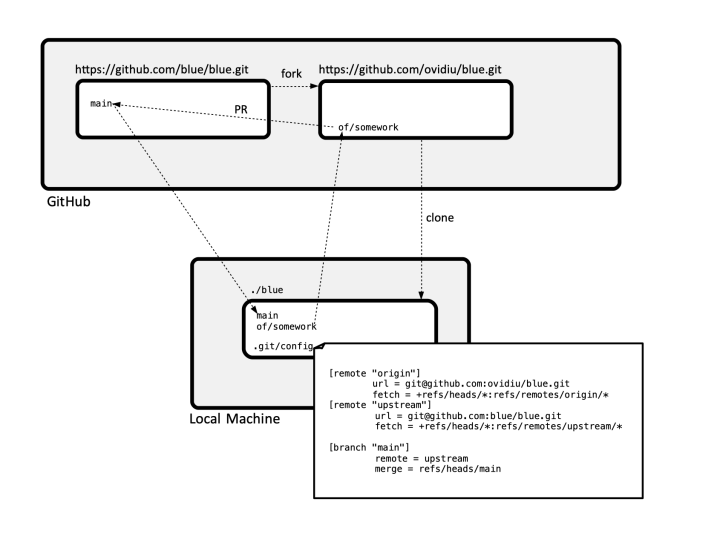Git Forked Repository Operations: Difference between revisions
(→CLI) |
(→CLI) |
||
| Line 106: | Line 106: | ||
How to deal with the leftover branch in the origin repository? | How to deal with the leftover branch in the origin repository? | ||
<syntaxhighlight lang='bash'> | |||
? | |||
git remote prune upstream | |||
</font> | |||
</font> | </font> | ||
Revision as of 22:34, 1 November 2023
External
Internal
Overview
For terminology, see upstream/base and head repositories.
The typical GitHub forked repository topology is similar to:
Fork
Go to GitHub UI and click on the "Fork" button at the top of the page.
Where should we fork <project-name>?
Use your own "personal" organization.
Forking <original-org>/<project-name>
Clone
Clone as usual:
git clone git@github.com:ovidiu/blue.git
Setup Relationships
Setup the "upstream" Repository
Establish a direct relationship between the local clone and the "upstream" repository. This will allow to pull the latest version of branches directly from the upstream repository.
git remote add upstream git@github.com:blue/blue.git
.git/config will contain:
[remote "upstream"]
url = git@github.com:blue/blue.git
fetch = +refs/heads/*:refs/remotes/upstream/*
This will allow us to fetch directly from "upstream"
git fetch upstream
Configure the "main" Branch to Update From Upstream
git fetch upstream
git branch --set-upstream-to=upstream/main main
This will configure the local "main" branch to track upstream's "main" branch. The .git/config will look like:
[branch "main"]
remote = upstream
merge = refs/heads/main
git pull will automatically apply upstream's "main" branch changes to the local main.
PR Cycle
Send a PR
Push the commit in the head repository.
It will show up in the UI.
Click "Compare & pull request"
The UI will give you the default choice to send the PR against the base repository while "Create pull request". Use it.
Merge the PR
Upon approval ...
How to deal with the leftover branch?
Sync the Repository after the PR Merge
From the GitHub UI
In the fork repository UI, use "Fetch upstream" button. Then git pull from the local clone.
CLI
git pull
Assuming the local repository was set as shown above, the command will bring the latest "main" changes and will allow us to delete the local feature branch after it was merged in upstream.
To clean up branches:
How to deal with the leftover branch in the origin repository?
<syntaxhighlight lang='bash'>
?
git remote prune upstream
